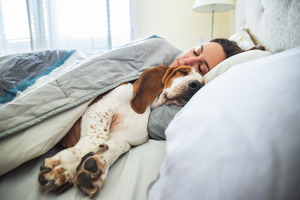
Plenty of pet owners are more than happy to let their furry friends snuggle up with them in bed, but is this a good decision for those who are struggling with sleep apnea? There are a number of factors that can end up having an impact on sleep-disordered breathing, and the presence of a pet could be one of them. Here’s why sharing a bed with your pet could be making your nights less restful.
How Do Pets Normally Impact Sleep?
According to some studies, sharing a bed with a pet can potentially have a negative effect on sleep efficiency, which is a ratio of how much time you spend asleep divided by the total amount of time you spend in bed. Slumbering in the same bed with a pet without a human partner could lead to reduced sleep efficiency; however, the difference is likely to be relatively small.
How Can Sharing a Bed with a Pet Affect Sleep Apnea?
If you have sleep apnea, chances are that you’re having a hard time getting the quality rest that your body needs. The disorder can cause recurring pauses in your breathing while you’re snoozing, typically as a result of the airway being partially or fully blocked. Whenever your breathing stops, your brain wakes your body up in an effort to get some air; as a result, your sleep cycle is constantly being interrupted throughout the night.
For those who have sleep apnea, sharing a bed with a pet can potentially exacerbate the problem. For example, you may have an even harder time staying asleep due to your pet making sounds or moving around. Furthermore, pet dander can potentially trigger allergies and lead to nasal congestion, which can make sleep apnea episodes more likely to occur.
How Can You Limit the Impact Your Pet Has on Your Sleep Apnea?
If you want to keep your sleep apnea symptoms under control, then it’s likely a good idea to stop letting your pet share your bed. It should still be okay for them to curl up in the corner of your bedroom at night, although you should make a point of regularly vacuuming and washing your sheets to get rid of allergy-triggering pet dander.
It’s important to be proactive when it comes to addressing sleep apnea. In addition to reducing your pet’s impact on the quality of your slumber, you should also seek out an appropriate form of treatment, such as a customized oral appliance. Kicking your pet out of your bed may not be pleasant at first, but it can ultimately help you feel a lot better, which will make both of you happy in the long run!
About the Author
Dr. Brooke Buller studied dentistry at The Ohio State University, and she is a proud member of Spear Education, the Academy of General Dentistry, and other dental groups. She prides herself on her ability to offer a comprehensive menu of services to her patients, including customized oral appliances for sleep apnea. If you’re looking for a solution for sleep-disordered breathing, you can schedule a consultation with Dr. Buller at Claybrooke Dental of Gahanna by visiting her website or calling (614) 475-1874.
